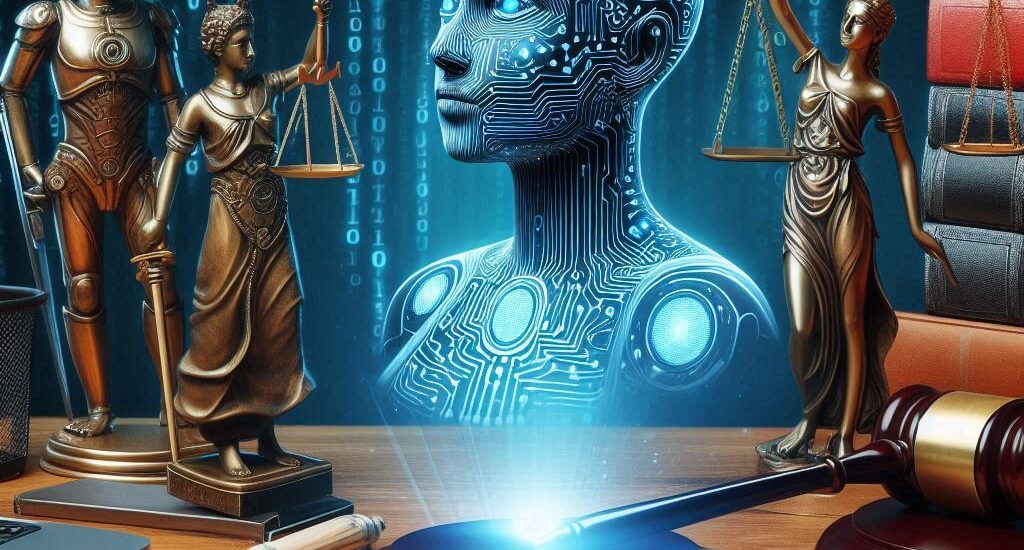



Over the past few years, artificial intelligence has appeared as a revolutionary and potentially transformative technology that enhances the ability to transform many industries, including the legal industry. Artificial intelligence is a useful and powerful tool that can completely assist the legal profession. It simplifies the work of legal professionals and improves the overall enhancement of legal procedures. Artificial intelligence can be a turning point for advocates, lawyers, law firms, legal institutions, and justice departments. Several AI-powered tools and machines are driving invention or creation in the legal world, such as CaseIQ, SpotDraft, LegitQuest, Legality, Ross Intelligence, Kira Systems, Casetext, etc.
On the other hand, there is a fear in the minds of legal professionals that artificial intelligence is replacing lawyers in performing their daily routine tasks, and it is adversely affecting the legal profession. But it is not completely true. AI just assists the legal profession, which is helpful in today’s legal world.
The Indian judiciary is facing barriers and burdens caused by the rise in the number of cases at present. Moreover, there is a developing need for transparency in our legal system. The Indian judiciary has recognized the capability of artificial intelligence as transformative by observing these challenges. Artificial intelligence modifies the Indian judicial system all over the world by studying and reviewing documents, summarizing them, executing various administrative functions, conducting legal research, determining bail and settlement of cases based on predictive analysis, etc.
The importance of artificial intelligence has been emphasized by the Chief Justice of India, DY Chandrachaud, along with the former Chief Justice of India, Sharad Arvind Bobde. According to them, artificial intelligence could play a vital role in completing the daily routine tasks and activities of the judiciary, which makes the decision-making procedure of the judicial system much easier. They further cited that AI enhances the ability to simplify legal terminology, make court proceedings more accessible to the general public, and help those prudent persons who are not aware of the law, are not capable of understanding the legal procedures, and do not belong to the legal background.
According to Justice L. Nageswara Rao, artificial intelligence would be employed to perform the administrative roles and functions that expedite the process of delivering justice.
Artificial intelligence has the potential to affect the lives of people in a huge range of contexts. Artificial intelligence can improve functioning, reduce the cost of time, reduce the burden of work, create inventive explanations, and give suggestions that can help legal professionals in their legal world. There are mentioned below various positive effects of artificial intelligence on the Indian legal system:
There are some negative impacts of artificial intelligence on the Indian legal system, which are mentioned below:
Artificial intelligence is a magical tool for lawyers and judges because it provides assistance to them without any cost and does not consume too much time. There are the following ways in which AI can provide future assistance to legal professionals:
It would be inappropriate to assert that AI is a replacement for a lawyer. This statement is completely untrue because AI is just a tool or technology that cannot replace lawyers in any circumstance. AI is a technology that assists lawyers in performing their daily legal tasks in an easier way, such as legal research, analyzing legal contracts, document review, draft pleadings, etc. AI does not have the potential like a human being to solve tasks, make decisions, give judgments, etc.
AI performs their legal tasks only, which is very time-consuming for legal professionals, and it also enhances the capabilities of lawyers, which is very good in today’s legal domain.
AI is a learning machine that can be used to perform legal tasks and to give assistance to lawyers so that they can complete their work more effectively. AI works on the commands given by a human being, and it does not replace the job of anyone, including legal professionals.
Artificial intelligence plays a vital role in the legal industry. AI, as a computer system capable of performing legal tasks and the daily routine legal activities of lawyers, is a time-saving moment for every lawyer, and the impact of time-saving is to reduce the backlog of pending cases in court. This new technological development has changed the legal framework entirely. The legal industry grows day by day with the help of artificial intelligence, and without this technology, it is difficult for lawyers to complete their work within a stipulated period. With the help of AI systems, lawyers can effectively complete their tasks.
With the help of AI, legal research is done within seconds, which is a very time-consuming task for lawyers, but AI makes it easier by just clicking a button. AI is a very helpful technology for legal professionals. There is a myth that AI is replacing the job of lawyers. It only enhances the work of lawyers and provides facilities or assistance to them in legal research, contract drafting, document review, etc. AI algorithms work only on the commands of human beings, and they do not take the place of humans. AI cannot give any judgment or make any decision like a human being. It’s just assisting legal professionals and doing all the work of humans, including lawyers, but that does not mean that AI will replace legal professionals.
Therefore, these technological advancements have shaped the legal landscape and provided efficiency in the legal sector.
[1] leaders, https://blog.ipleaders.in/impact-artificial-intelligence-legal-system/ (June 25, 2024, 2:11 pm)
[2]live law https://www.livelaw.in/lawschool/articles/law-and-ai-ai-powered-tools-general-data-protection-regulation-250673 (June 25, 2024, 2:13 pm)
[3] International Journal of Law Management and Humanities, https://ijlmh.com/paper/impact-of-artificial-intelligence-on-legal-industry/ (June 25, 2024, 2:16 pm)
[4]Legal Services India, https://www.legalserviceindia.com/legal/article-10548-impact-of-artificial-intelligence-on-indian-legal system.html#:~:text=Accurate%20analysis%20of%20legal%20data,data%20efficiently%20within%20short%20period. (June 25, 2024, 2:20 pm)